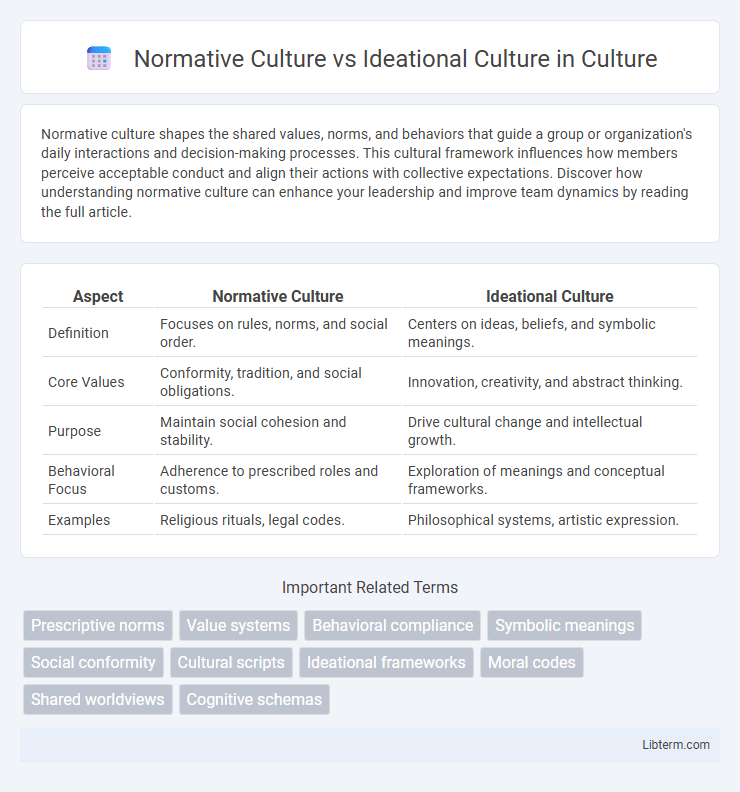Normative culture shapes the shared values, norms, and behaviors that guide a group or organization's daily interactions and decision-making processes. This cultural framework influences how members perceive acceptable conduct and align their actions with collective expectations. Discover how understanding normative culture can enhance your leadership and improve team dynamics by reading the full article.
Table of Comparison
| Aspect | Normative Culture | Ideational Culture |
|---|---|---|
| Definition | Focuses on rules, norms, and social order. | Centers on ideas, beliefs, and symbolic meanings. |
| Core Values | Conformity, tradition, and social obligations. | Innovation, creativity, and abstract thinking. |
| Purpose | Maintain social cohesion and stability. | Drive cultural change and intellectual growth. |
| Behavioral Focus | Adherence to prescribed roles and customs. | Exploration of meanings and conceptual frameworks. |
| Examples | Religious rituals, legal codes. | Philosophical systems, artistic expression. |
Understanding Normative and Ideational Culture
Normative culture encompasses the shared values, norms, and behaviors that guide social conduct within a group, emphasizing what is considered acceptable and obligatory. Ideational culture involves the collective beliefs, ideas, and cognitive frameworks that shape how members of a society interpret reality and make sense of their environment. Understanding normative and ideational culture is essential for analyzing how societies maintain cohesion through shared rules while also evolving through changing worldviews and ideologies.
Key Differences Between Normative and Ideational Cultures
Normative culture emphasizes adherence to established norms, rules, and social expectations that guide behavior within a society, while ideational culture centers on abstract ideas, values, and belief systems that shape cultural identity and meaning. Key differences include the focus on external behavioral conformity in normative cultures versus internal cognitive frameworks and symbolic meanings in ideational cultures. Normative cultures prioritize social order and predictability, whereas ideational cultures emphasize innovation, creativity, and interpretation of symbolic content.
Core Characteristics of Normative Culture
Normative culture is defined by strong adherence to established rules, norms, and formal procedures that guide social behavior and decision-making within a group. Core characteristics include an emphasis on stability, predictability, and conformity, ensuring that members act consistently according to shared values and expectations. This culture contrasts with ideational culture, which prioritizes creativity, innovation, and the generation of new ideas over strict rule-following.
Core Characteristics of Ideational Culture
Ideational culture centers on shared beliefs, values, and symbols that shape societal norms and collective identity, emphasizing the primacy of ideas over material conditions. Its core characteristics include a strong emphasis on symbolic meaning, collective identity formation, and a preference for tradition and stability over change. This cultural framework prioritizes cognitive structures and ideological frameworks as the basis for social organization and behavior.
Social Rules and Values in Normative Cultures
Normative cultures emphasize adherence to established social rules and collective values that dictate appropriate behavior and maintain social order. These cultures prioritize conformity, tradition, and clearly defined expectations to ensure group cohesion and stability. Social rules in normative cultures often govern interpersonal interactions, roles, and responsibilities, reinforcing a shared moral framework.
Belief Systems and Ideas in Ideational Cultures
Ideational cultures prioritize belief systems as foundational frameworks that shape social behavior, norms, and collective meaning, emphasizing abstract ideas and values over material conditions. These cultures value ideologies, religious doctrines, and philosophical principles that guide individual and group identity. Compared to normative cultures, which focus on established rules and customs, ideational cultures derive authority from shared beliefs and conceptual understandings that influence cultural cohesion and decision-making.
Case Studies: Normative vs Ideational Societies
Normative cultures emphasize social order, rules, and role conformity, often observed in societies like Japan where collective harmony and clear behavioral expectations prevail. Ideational cultures prioritize values, beliefs, and symbolic meanings, exemplified by Scandinavian countries that focus on individual self-expression and progressive social ideals. Case studies reveal that normative societies maintain stability through structured norms, while ideational societies adapt and innovate by fostering ideological diversity.
Influence on Behavior and Social Expectations
Normative culture shapes behavior through established rules, customs, and social norms that dictate acceptable conduct, reinforcing conformity and social order. Ideational culture influences behavior by emphasizing values, beliefs, and shared meanings that guide individuals' motivations and aspirations. Social expectations in normative cultures are more prescriptive and enforced, while ideational cultures foster internalized principles driving voluntary adherence to societal ideals.
Impact on Innovation and Change
Normative culture emphasizes established rules and shared values, often leading to resistance against radical innovation and slower adaptation to change. Ideational culture prioritizes creativity, open-mindedness, and conceptual thinking, fostering an environment where novel ideas and transformative innovations thrive. Organizations with ideational culture typically exhibit higher innovation rates and greater agility in responding to technological advancements and market shifts.
Bridging Normative and Ideational Approaches in Modern Societies
Bridging normative and ideational culture approaches in modern societies enhances the understanding of social behavior by integrating shared values and collective meanings with established social norms and rules. This synthesis facilitates more effective policy-making and social cohesion as it acknowledges both the internal motivations and external guidelines influencing individuals. Emphasizing this combined framework promotes adaptive cultural dynamics essential for addressing complex contemporary challenges.
Normative Culture Infographic

 libterm.com
libterm.com